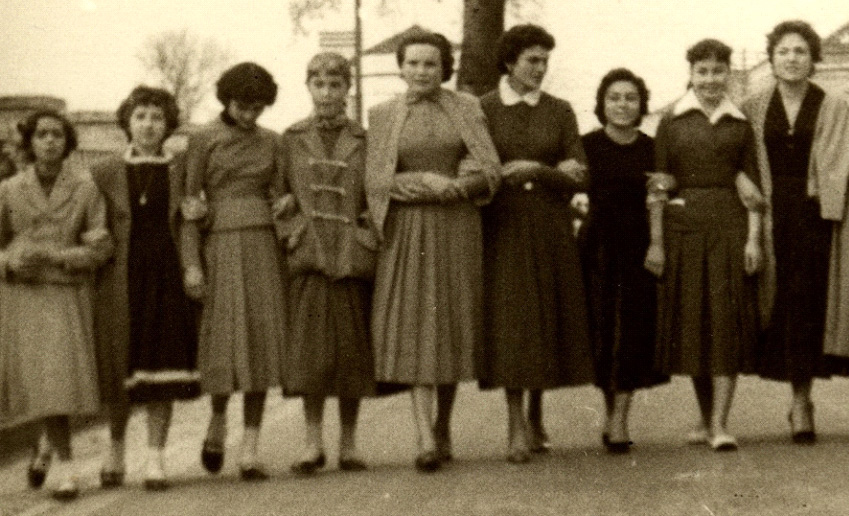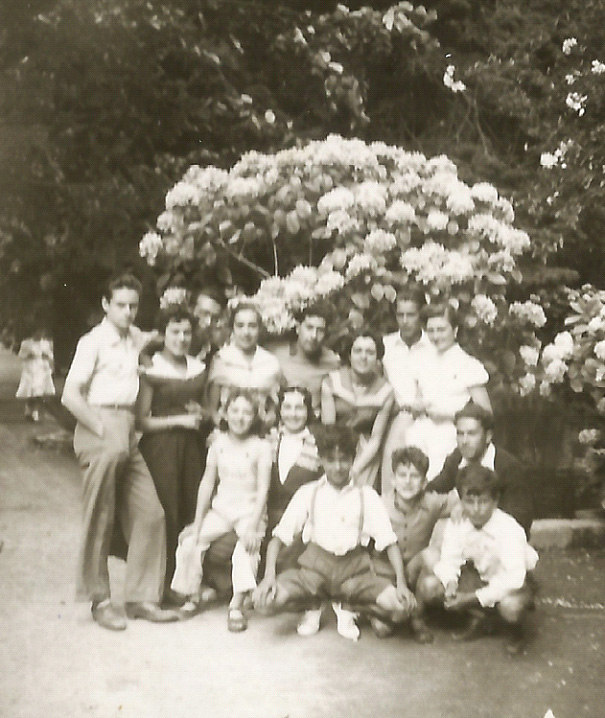Memories of Vilar
Hello Frank, Danny, Lina and other cousins. I come to give you some more information about Vilar and the Vilarense branch of the Da Cruz family.Raimundo Narciso
Lisbon, 2018-01-16
Vilar in the 1950s
The people of the village lived from agriculture. Almost all the agricultural land was vineyard although there were also some vegetable gardens and fields of cereal grains. But Vilar lived from winemaking!The only places of conviviality for men were the taverns where wine was served. The men in our family were not frequenters of the taverns. My father Manuel went to a tertulia (discussion group) of three or four friends, who would meet at night in the pharmacy with their friend, the pharmacist.
The women occupied themselves with domestic life and attended church, many of them once, twice or three times a day.
How did courting work in Vilar in the 1950s?
On Sunday afternoons the girls and boys strolled in lines stretching across the road, 200 meters down 200 meters back. The group of girls crossed paths with the boys and they looked at each other and made small talk. Sometimes they stopped for a while and chatted in groups. The traffic on the road, which linked Cadaval to Torres Vedras and Lisbon, was one car per hour!

|
| Linha de raparigas, Vilar, about 1956. Left to right: 4. Maria do Carmo (Micá); 7. Teresa Nobre Santos; 8. Helena Maria Narciso. |
In addition to these Sunday promenades after Mass, in the summer there were the celebrations of the religious festivals of Vilar and nearby villages. An orchestra played in the bandstand: waltzes, tangos, viras, and "slow dances" and the young along with the less young danced or just watched.

|
| Left: Raimundo; Center: sister Helena |
Looks exchanged, a few words exchanged, one or another dance, some groping at the religious party ball and the way was open for the courtship. At this point the young maiden's love-seeker went to the girl's father and asked for her hand. The father would assess the situation — whether the boy was fit to be his daughter's husband, whether he had land — and if he gave his consent, the relationship would move to the next stage: the window.
The girl at the window of her house and the boy on the street. After a probationary period and if the signs are promising, the courtship continues at the door. The girl inside the door and the boy outside. And then inside the house with the mother close by in her chair to freeze any sinful thoughts and ensure the good behavior of the boyfriend.
Within 15 or 20 years all this had changed.
Economy
Agricultural property was very distributed and the difference between "rich" and "poor" was small. Nothing compared to the situation of the McDonald's CEO who, according to a Bloomberg study, earned 644 times more than the average of his thousands workers in 2012. There were, however, a small number of the marginalized who lived on the outskirts of the village.Harvesting the grapes to be transformed into wine in the various mills of the village, which took place in September and October, was the moment of greatest labor, agitation and alteration of the routine. Many farm laborers came from the poorer regions of the country to the great bustle of harvest. They lived poorly, in improper places provided by the owners of the vineyards who employed them during this period.
The new church
One of the greatest mobilizations of the entire village took place for the construction of the church that replaced the small existing chapel. Volunteer work for months or years, and donations of countrymen, was inaugurated in 1953. Manuel also expressed his solidarity and contributed money but, as a self-proclaimed atheist — unique in the village — he explained that it was for the great clock of the tower, whose chimes guided the peasants without a watch across the field.The brothers and sisters da Cruz Narciso
Manuel had much appreciation for his brother Daniel [in the United States] and they corresponded frequently. When Louise [Daniel's widow] visited him in 1971, shortly before he died, and found him very aged and sick with cancer.Manuel's relationship was good with all the brothers and sisters. The longest and closest was between Manuel and his sister Maria da Cruz; they visited each other frequently. She lived 10km north of Vilar in Ermejeira, and every now and then she would spend a day or two at our house. In the winter, around the brazier, at night, my sister and I would tell stories of enchantment, stories of Vilar's youth. Another very close relationship was between Manuel and his brother Francisco and his nephews Diniz and Francisco and their nieces Alice, Magdalena and Luzia, a little younger than Uncle Manuel. A good relationship despite very opposite political ideas. They liked to discuss politics and the developments of World War II.
The 1960s and 70s
Our aunt Maria José (Maria do Santo Lenho) was a nun, and also affectionately close to us. I visited her several times when I was studying in Lisbon and I went to say goodbye to her when, in 1964, I went into hiding. I told her I was going to Germany and she told me that she would pray for me, which I thanked her for, and later I concluded that it was her commitment to the Most High that protected me from the political police and prevented PIDE [Portuguese secret police, similar to Gestapo] from finding me.

|
| PIDE photo |
In 1972 several agents of the PIDE invaded the house of my parents, in Vilar. Manuel had already died a few months before. My mother lived alone and very sad, unaware of her son and daughter in France. She was frightened, the PIDE agents turned the house upside down and then made her sign some papers. Then the neighbors frightened her even more by telling her that it was surely not the police but criminals and the papers she signed would say that she had sold them the land and the house!? My mother, with ingenuity and a lot of courage went to Lisbon to PIDE headquarters to make sure and demand explanations!
Everything is written in detail in the book I published in 2000, ARA - Armed Revolutionary Action.
Translated from the Portuguese by Frank da Cruz, 2018-01-17.